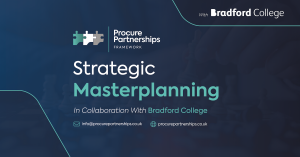In our previous blog, we discussed the significant benefits that framework procurement can offer public sector customers. Here at Procure Partnerships, we have seen the interest in our construction procurement framework climb sharply; in the 18 months we have been running, we have delivered an impressive £300 million of projects through the framework. With commentary from two Project Management consultants who have used the Procure Partnerships Framework recently, Day Project Management Ltd and Square Zero, in this blog, Faye Dolan discusses the future of procurement frameworks and the predicted rise in public sector uptake.
Innovation in Public Procurement
Each year the government spends approximately £284 billion buying goods and services from external suppliers, a figure which amounts to almost a third of all public expenditure. Through innovative and strategic public sector procurement, it is possible to generate significant savings for central and local government and improved economic value. As a significant source of income to the construction sector, the public sector is well positioned to use this demand to drive innovation in the development of both products and services. The Green Paper ‘Building our Industrial Strategy’, issued by the Government in 2017, states the importance of taking a strategic approach to government procurement in order to encourage investment in innovation and skills, to strengthen the UK’s supply chains, to increase competition and to create more opportunities for SMEs.
Frameworks provide the mechanism to make this happen, with the added benefits of better project results and improved public relations! Through strategic procurement options and flexible routes to market, framework procurement offers significant opportunities to drive efficiencies in the public sector. A suite of fully compliant procurement routes is an attractive draw for many public sector customers who have challenging procurement and construction timescales to achieve. ‘Bundling’ smaller project together can help to increase their attractiveness to contractors and ensure market competition, leading to significant savings in both project timescales and budgets. Framework objectives are often aligned with public policy and aim to deliver on issues such as the promotion of SME’s, the creation of benefits to the local economy and the delivery of training and apprenticeship opportunities.
A Properly Structured Framework Can Reduce Waste and Increase Efficiencies.
Frameworks can provide a streamlined approach to procurement which benefits both the customer and the contractor. This is a principal supported by Jack Street, Director of Day Project Management Services, who comments:
“There are obvious benefits to using a framework, such as avoiding the OJEU procurement route. Procuring a project over the OJEU threshold can traditionally mean that the competition is widened out to any interested party and we will need to undergo a lengthy pre-qualification exercise. To reduce this down to a more manageable tender list can be time consuming. Using a framework means we can very quickly pull together a tender shortlist whilst still complying with all OJEU requirements.”
There are currently numerous active frameworks and contractor ‘select lists’ for public sector bodies to choose from. Despite the considerable resource required to set up and manage them, and the great effort on behalf of the contractors to qualify for a place, many of these frameworks have very few schemes actually procured through them. This can quickly lead to contractors becoming disenchanted with the principle of the framework, reducing their motivation to be competitive and limiting the value achieved by the process. Whilst frameworks are an excellent way to deliver value to the public sector, they must be properly structured with sufficient work procured through them to make them viable, otherwise they become another cause of waste in the procurement system. So, in order to maximise the benefit to the public purse, what do public sector procurement specialists need to consider when choosing which framework to use?
A framework should exist primarily to support the public sector and to create cost benefits.
The guiding principle behind all procurement frameworks should be to save the public sector money and deliver efficiencies for the taxpayer. To check if the framework actually delivers on its promises, previous performance should be available for review in the form of KPIs. There is no ‘one size fits all’ approach in procurement, every project is different and has specific requirements. A framework team should be able to advise and guide the procuring body and offer flexible procurement options, such as single-stage, 2-stage or direct award, helping customers to realise their objectives whilst ensuring full compliance. Framework procurement experts should work as a fully integrated part of the customers team to provide expert advice on the best routes to market.
A framework should provide simple and straight-forward procurement opportunities, for both the contracting authority and the contractor.
Frameworks will continue to be a popular option for the public sector if they offer a faster, less resource intensive route to market. This also benefits the contractor; if the procurement route reflects the nature of the contract and is sensible and manageable, there will be much more interest in the opportunity. Simple and straight forward procurement which provides real opportunities is the way to get local SMEs embracing public contracts and driving innovation.
Quality of delivery and opportunities for innovation should be a key concern of the framework provider, with KPI’s implemented and measured.
The role of a responsible framework provider does not stop once the procurement is complete. Project delivery should be closely monitored and measured throughout, with Key Performance Indicators set to clearly demonstrate performance. Through collaborative project workshops and pre-construction involvement, opportunities for innovation can be identified early in the process and then delivered throughout the project. By closely monitoring project progress and identifying and resolving issues quickly, frameworks have the potential to maximise value achieved. Through early problem resolution, the Procure Partnerships framework can evidence that 100% of projects have been completed within agreed budgets and 95% of projects have been delivered on time.
Jack Street of Day Project Management Ltd, comments further: “Customers will benefit from the ongoing support from the frameworks themselves if issues or problems are experienced during the tender and construction phase, they can be quickly ironed out to the satisfaction of all parties. Contractors are usually very keen to retain their standing on frameworks, so are quick to come to an agreement around any problems which may occur.”
Value to local economy through the support of SMES and fair payment agreements should be prioritised.
The clear visibility of contract opportunities and consistency of workload that a framework provides makes local contractors keen to get onto and remain on frameworks. Without the need for unnecessarily complex tender responses, there will be a much greater response from the local supply chain during a tender process. Importantly for the local economy and for SME’s, on the Procure Partnerships framework, major contractors must commit to paying subcontractors within 30 days, a KPI which currently stands at 100%. This has huge ramifications for the extended supply chain and beyond and provides important reassurance and confidence in the form of cash flow, often a significant problem for small and medium sized businesses. If suppliers get paid on time, they will offer up their most competitive cost for future projects.
The Social Value potential of every public pound should be maximised to benefit the local community.
Engaging a contractor through a procurement framework allows the public sector to access a structured approach to Social Value reporting through a suite of Social Value KPIs. The public body can choose where this investment is made to in order to deliver a tailored and meaningful impact on the local community. This could be in the area of training and job opportunities, crime reduction, ethical procurement or healthier communities. Targeting whichever local issue is important to the procuring public sector body is a practical way to deliver real social benefit.
The Future of Frameworks
As we leave the EU, there is of course a level of uncertainty around the future direction of public sector procurement. However, we believe there also lies huge opportunity for more efficient ways to procure public sectors works and to maximise buying power. Chris Tonge, Director of Project Management Consultancy, Square Zero, believes that frameworks will continue to be an important and reliable way to successfully procure projects in the future. Chris comments:
“Procuring construction partners through a framework is an excellent way to encourage positive engagement with all members of the project team. It is important that we work with a framework operator who aligns with our own collaborative ethos and is able to provide access to a supply chain that is pre-vetted and monitored. It is also important to us to have a supportive framework operator that will engage with client organisations and project teams through the lifecycle of a project.”
Whilst it is clear that procurement frameworks will play a significant part in supporting the public sector, fundamental to their continued success is a high level of service and support and an ability to understand and embrace the key drivers behind the public sector organisations



